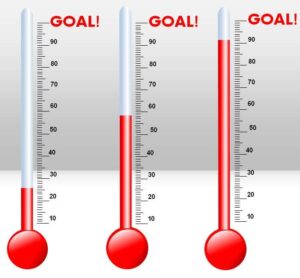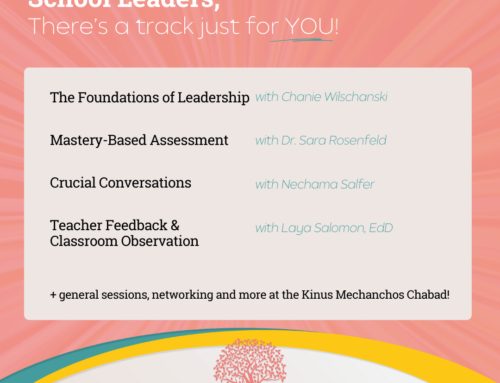Chinuch From the Inside Out:
As seen in the EmBRace Magazine
By: Mrs. Chanah Rose
In the quest to measure, track and encourage the growth of our students and children, parents and teachers use checklists as a helpful tool. Within the school system, checklists often com e with an incentive at the end, further encouraging growth in an age appropriate way. Outside of school, a checklist – literal or internal – is a form of Cheshbon Hanefesh, and there are many benefits to checklists of various kinds:
e with an incentive at the end, further encouraging growth in an age appropriate way. Outside of school, a checklist – literal or internal – is a form of Cheshbon Hanefesh, and there are many benefits to checklists of various kinds:
- Checklists can turn lofty aspiration into SMART goals – small, measurable, achievable, relevant, and time-bound.
- Growth becomes concrete as you incorporate visual and tactile modalities into setting and meeting your goals.
- That dopamine rush when you check off a box as complete! (Yes, I’m one of those people who starts every to-do list with items I’ve already done, just so I can check them off.)
- אדם נפעל כפי פעולותיו – a person is affected by his actions. By using checklists, we can accustom ourselves to habits, routines and behaviors that will ultimately become part of them and shape who they are.
These advantages are many and they are real. However, sometimes, and for some people, there are also pitfalls. By being aware of these concerns we can ensure that checklists meet the goal of encouraging true and lasting growth, instead of merely measuring it in the short term.
A Yardstick to Measure by…. Or a Ladder to Grow On?
The main challenge is with checklists when applied to personal growth. As educators, we need to ask ourselves the following questions: Is growth linear? Is it always apparent and measurable? Beyond Halacha, are Yiddishkeit and Chassidishkeit one size fits all? When we check off our list, have we “arrived,” or rather, is Avodas Hashem infinite and lifelong?
We have so internalized the Rebbe’s horaos, and our ideal version of what a Chassid should look like, that we all have an internal checklist that we use as a measuring stick. Because Avodas Hashem is infinite, inevitably, we – and others we use the measuring stick for – fall short.
Perhaps instead of thinking of a checklist, we should think of a ladder – steps provided to us to climb ever higher in our quest to serve Hashem and bring Moshiach. In this way, it matters not where we are on the ladder, but that we are climbing.
In a famous story, someone visiting the Rebbe asked how he can be considered a Chassid. The Rebbe answered, “If you decide each day to be a little bit better than the day before, I’m happy to consider you my Chossid.”
Have we truly internalized this message? In seminary, Rebbetzin Sara Kaplan of Tzfas made a powerful point to us young women: Why do you think that the Rebbe loves every Jew on the dollar line, with long hair and ripped jeans, but not a Lubavitch girl who hasn’t said Chitas?
Especially as women and mothers, we may find that the checklist mentality stops working for us, yet it persists, putting a downer on our self-concept as Chassidishe women, who have very different schedules and priorities than Chassidishe seminary girls.
For me personally, as a mother of young children, I have had to realize that my avoda is not necessarily to do everything on the “checklist” – but to choose this path as mine, so that I am always growing on it. And when pockets of time begin to open as my children grow, instead of a mid-life crisis I have my “checklist” – or rather ladder – of the Rebbe’s inyonim that await.
In fact, the things we don’t yet do are what give us a reason to wake up in the morning. Chassidus opens up our horizons, gives us goals that are bigger than ourselves, and expands new dimensions in what we aspire to, filling a real existential need to constantly grow. Even if someone has checked everything off of their current checklist, they will be happy to know that in Chassidus, we have never arrived. The rungs of the ladder that we have not yet attained, are as important to our spiritual growth as those that are already behind us.
A Lens to View Others
 Just as we need to be wary of measuring ourselves up constantly against a checklist, we need to be careful of how we view others.
Just as we need to be wary of measuring ourselves up constantly against a checklist, we need to be careful of how we view others.
Do I look at my students as either the ones who do everything they’re supposed to and the ones who don’t, or do I look at them as unique individuals with infinite permutations of strengths, challenges, and potentials? Do I quickly size up and categorize other women I meet, instead of waiting patiently to get to know their interests, struggles, passions and goals? Do I panic when comparing my children to neighbors who may daven on vacation days and say Shabbos Mevorchim Tehillim without fail, or do I look at them with a lifetime of growth ahead and seek to discover what they need to help them grow right now?
What about children with sensory or executive functioning challenges they need to overcome to help them organize their time and their tasks? And what of our friends, students and community members who have been through or are in the process of working through gigantic personal, health or family challenges which constitute a very different and immeasurably meaningful Avoda?
When we break the Matza each year at the Pesach Seder and choose the bigger half to put away from Afikomen, we quote the famous response of the Tzemech Tzedek to a guest who was carefully measuring which half was bigger: “A gadol vas men darf em mestin, iz kein gadol nit — one whose greatness has to be measured, is not really great.” We can keep the ladder, but let go of the yardstick, because we never really know the greatness of another Neshama.
Chanah Rose is the Educational Director of the Menachem Education Foundation. She can be contacted at c.rose@mymef.org.




